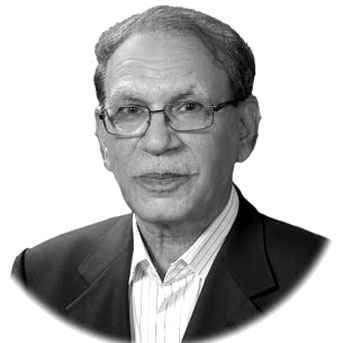Mohammad Jamil
IN the past, many All Parties Conferences were held and alliances formed by the opposition parties to get rid of the elected or praetorian government. Before Zia-ul-Haq’s Martial Law, PNA was formed and political parties vociferously protested against Bhutto government accusing it of rigging the elections. But it led to anarchy and chaos that resulted in imposition of Martial Law. Even before Pervez Musharraf’s Martial Law, Alliance for Restoration of Democracy was formed by the opposition parties led by Nawabzada Nasrullah Khan, but could not make a dent in PML-N government. In 1999, the then Prime Minister Nawaz Sharif sacked then COAS General Pervez Musharraf when he was airborne. Other Generals who were fed up with Nawaz Sharif’s arrogance acted, arrested him followed by Martial Law. Musharraf government had claimed Prime Minister Nawaz Sharif was overthrown in a counter-coup. Anyhow, no lessons seem to have been learnt.
Once again, convening of an All Parties Conference to chalk out a program to get rid of PTI government is talk of the town. But both PML-N and the PPP leaders have different plans to achieve their objectives. Last year, both parties had promised to participate in Maulana Fazlur Rahman’s Azadi March and Dharna, but remained confined to lip service and press statements. The march from Karachi to Islamabad and the dharna (sit-in) in Islamabad was attended by people from three KP districts only. The other day he said that major opposition parties did not support him. Opposition has been a divided house ever since the PTI-led government has come into power in August 2018. The split within the opposition was visible when the PPP refused to vote for PML-N’s Shehbaz Sharif as a joint opposition candidate for the Prime Minister’s election. They also went their separate ways to elect the President.
Though the PML-N and the PPP are extremely angry with the PTI government and they view the on-going accountability process as political victimisation, both are not in favour of total collapse of the current political system. The PML-N knows that it is the largest opposition party in the National Assembly with electoral support in the Punjab, and hopes to emerge as the majority party from that province in the next elections. This hope makes the PML-N reluctant to play a second fiddle to the Maulana. The PPP has stakes in the current political system as it rules Sindh, and given its performance, its leadership is not sure if it will get the number of seats it bagged in 2018 elections. However, PML-N and PPP are not a threat to the PTI government; however PTI has to deliver to remain relevant to the people.
During Praetorian rule of Pervez Musharraf 16th and 17th amendments in 2003 or 18th and 19th amendments to the Constitution made during PPP-led government in 2010 were power-sharing formulae between the ruling elite, and there was nothing for the masses. The idea of electoral reforms tossed around by the politicos is also for the plutocrats, as the people belonging to poor and middle class families cannot afford to field themselves as candidates in elections due to the exorbitant cost involved. Anyhow, sloganeering by the opposition parties will not promote the democracy project because it is sham democracy. The genuine democracy is all for people; but given the majority of the people living in the thralldom of sardars, waderas, some of them are pirs as well, and in the cities clout of industrial tycoons and their nominees, they will have majority in National Assembly and the Senate. Thus they will continue to ride a rough shod over the wretched of the earth, as people’s welfare does not exist in their scheme of things. Majority of people especially those living below the poverty line want the change in the status quo; they want improvement in living conditions. The question is how to empower the disenfranchised citizenry of the rural areas to be master of its own destiny where a domineering aristocracy holds human beings in countless numbers in its bondage? The way out for emancipation, empowerment and enfranchisement of this hapless enslaved humanity is to make them owners of the land they are tilling. But surely the oligarchs holding all the sway over nation’s politics would certainly not allow it to happen. Has anyone heard voices coming out of political parties or media studios, or from NGOs or human rights watch groups against repressive jagirdari system?
Has anyone heard of holding seminars by civil society, not to speak of starting a long march for land reforms? In Pakistan, unless remnants of feudalism, jagirdari system, and tribalism are done away with, there is no hope that democracy system could work. Late General Ayub Khan had announced land reforms in 1958; late Z.A. Bhutto announced first land reforms in 1973 and second land reforms in 1977, thus further reducing ceilings on private ownership of farmland to about 100 acres of irrigated and about 200 acres of non-irrigated land. Zia-ul-Haq had created the Federal Shariat Court (FSC) to review whether the law was repugnant to the injunctions of Islam. Shariat Court gave the verdict that land reforms were legal. But petitions were filed in the Shariat Appellate Bench against the judgment of the Shariat Court.
The Bench comprised Mufti Taqi Usmani, Mufti Pir Karam Shah, Justice Afzal Zullah, Justice Nasim Hassan Shah and Justice Shafi-ur-Rehman. Mufti Taqi Usmani wrote the lead judgment declaring that land reform legislations were repugnant to Islam. However, Justice Nasim Hassan Shah and Shafi-ur-Rehman put up a dissenting note stating that limit on land holdings was necessary to reform the society and alleviate poverty. But the verdict sealed the fate of land reforms, as majority of lawmakers have vested interest.
—The writer is a senior journalist based in Lahore.









